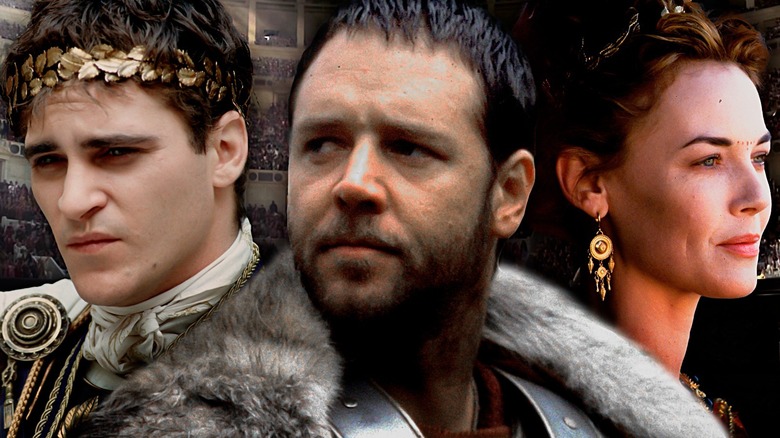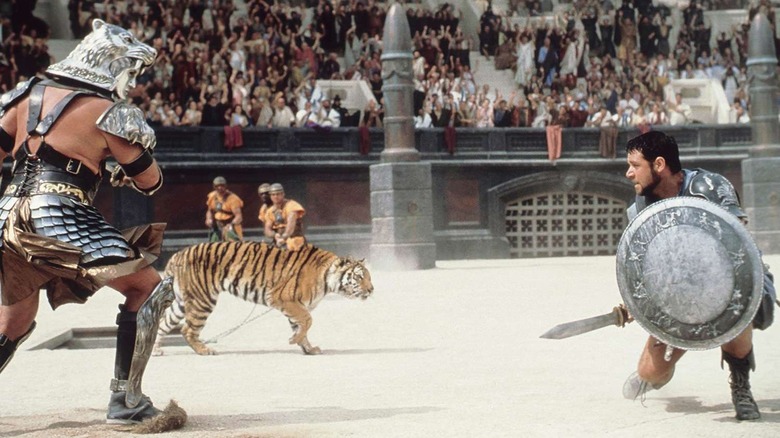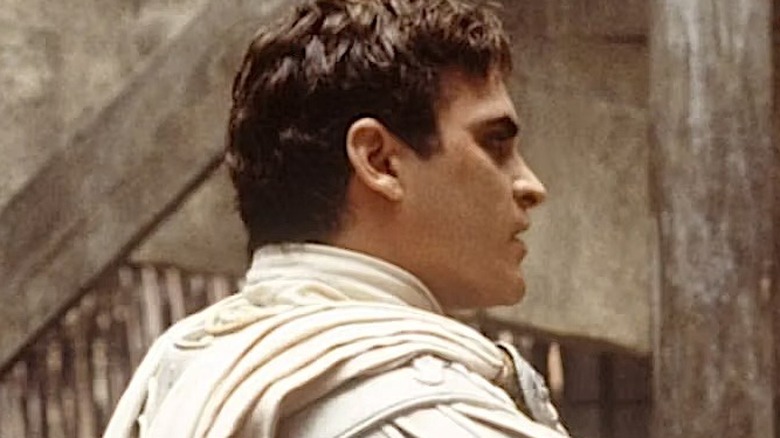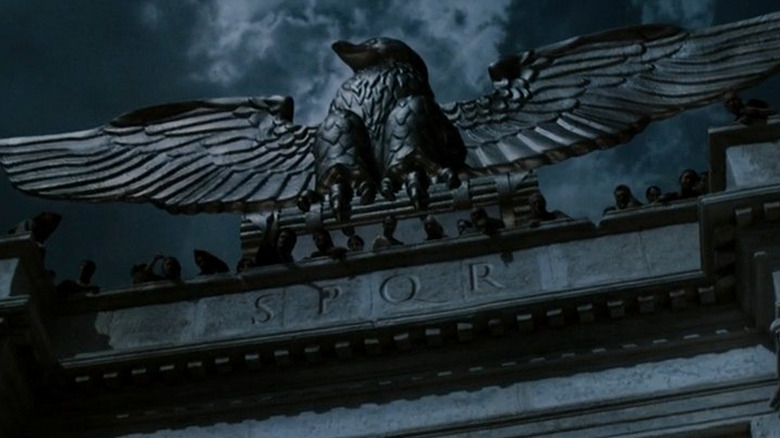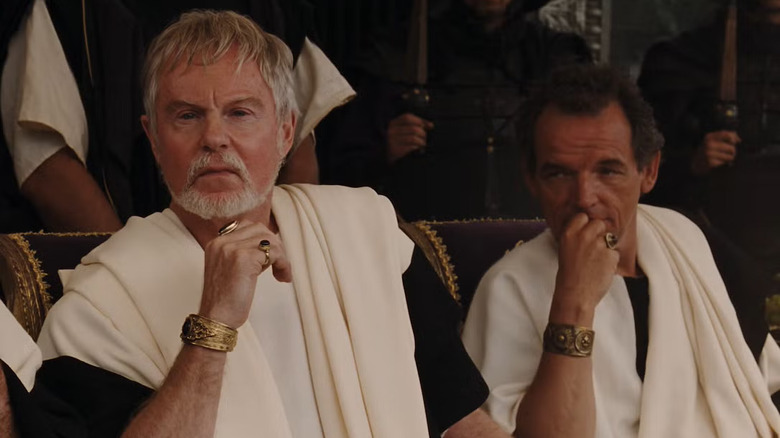Gladiator: 5 Historical Inaccuracies That Make The Movie Better
From iconic period pieces like "Kingdom of Heaven" and "Robin Hood" to "The Last Duel," "1492: Conquest of Paradise," and more, director Ridley Scott is a well-known commodity in the historical drama genre. His most recent entry, "Napoleon," had its merits, but overall it failed to wow audiences. This was due partly to the fact that it had a slew of historical inaccuracies. It also struggled when compared to Scott's other historical films — especially his magnum opus: "Gladiator."
That iconic film is nearly a quarter of a century old, and it still holds up as one of the greatest action flicks of the 21st century. Unlike "Napoleon," "Gladiator" captivates audiences through the tragic story arc of its noble and courageous protagonist, Maximus (Russell Crowe). But while the clearly heroic story arc gives "Gladiator" a leg up over a movie like "Napoleon," the film isn't necessarily more accurate. On the contrary, it's riddled with inaccuracies. Does Ridley Scott care? Based on his reaction to critics of "Napoleon's" historicity (he blasted fact-checkers, telling them to "get a life"), we're guessing probably not.
There's good reason for Scott's brazen disregard for naysayers, too. "Gladiator's" historical aberrations don't feel like a mistaken failure to adhere to the historical narrative. If anything, they often feel deliberate and add to the gravity and impact of the story. Don't believe us? Here are five examples of changes that Scott made in "Gladiator" that aren't just okay. They actually make the movie better.
Commodus killing his father
It doesn't matter if you're watching a young Joaquin Phoenix strutting around elaborate Roman movie sets or if you're reading up on the original man himself — Commodus is a really bad dude. Encyclopedia Britannica sums up the infamous emperor by stating, "His brutal misrule precipitated civil strife that ended 84 years of stability and prosperity within the empire." Ouch.
One thing Britannica doesn't say is that Commodus kicks things off by suffocating his father with his own two hands. While the young ruler's reign devolves into chaos over time, it's generally accepted that it starts with relative stability and without the need for patricide. On the contrary, Marcus Aurelius (Richard Harris in the movie) is believed to have died from an illness while on the front lines fighting barbarians.
However, contemporary historian Cassius Dio does go out of his way to state that Aurelius may have been killed by his doctors. The historian claims he was clearly told that the physicians were trying to do Commodus a favor. Even so, Dio adds, "When now he was at the point of death, [Marcus Aurelius] commended his son to the protection of the soldiers (for he did not wish his death to appear to be due to Commodus)."
Of course, in Scott's telling, Commodus directly murders his father, who is plotting to set up his general, Maximus (Russell Crowe), in his place on the throne. While not technically accurate, this event, which takes place early in the movie, immediately adds a sense of drama and tension to the story. It raises the stakes, accelerating Commodus' evolution into an emotional and immature villain willing to stoop to anything to get what he wants. It also positions Maximus as the aggrieved party from the jump.
Inventing Maximus
We hate to break it to you, but "Gladiator's" Maximus isn't a real person. That's right, Russell Crowe's character, Maximus Decimus Meridius, was entirely made up for the movie. While he was fabricated for the film, though, the hero wasn't created out of whole cloth. He appears to be a complicated fictional individual inspired by a smorgasbord of real-life Roman generals, leaders, and possibly even an emperor or two.
For instance, there are echoes of Marcus Aurelius' generals, Marcus Nonius Macrinus and Avidius Cassius. But neither of these is a perfect match, as Macrinus lives a long life and Cassius is killed by his own soldiers. There are other candidates with recognizable factors as well, none of whom quite line up with Ridley Scott's story.
The invention of a character like Maximus is the perfect way to pull off a movie like "Gladiator." It freed up Scott to more or less stick to the historical Roman story while mixing in someone who could function as the straw that stirs the narrative drink. Maximus also gave the director the freedom to build a story to his liking. He could pull on the audience's collective heartstrings by giving Maximus a family and then ripping it away. He could have Maximus rise through the gladiatorial ranks and challenge his emperor's legitimacy without the need to find a historical narrative that fits that story mold. Creating Maximus and placing him in a historical setting was the perfect way to pull off a movie of this nature.
Commodus dying in the arena
Commodus (Joaquin Phoenix) is one of the most villainous figures in all of Roman history. The iconic baddie became emperor as a youngster (he wasn't even 20 years old), and his youth and immaturity led to a string of increasingly erratic and unhealthy decisions. His sister, Lucilla (Connie Nielsen), does plot against him in real life, and once she's caught, the betrayed royal has his sibling executed. (We'll see how Ridley Scott handles that detail in "Gladiator 2" now that his Commodus is dead.)
The historical Commodus' reign is categorically horrendous, and Scott's story admittedly does a good job of portraying that fact. However, the tyrannical ruler's cinematic story starts incorrectly with his patricidal acts, and it ends with historical inaccuracies, too. That's right — the real Commodus wasn't killed in the arena shortly after becoming emperor.
To be clear, he did fight in the arena, even though this was considered a debased and embarrassing action in Roman culture and something an emperor should never do. But he didn't die there. Instead, Cassius Dio explains that many years later (more on the length of his reign in a bit), Commodus was killed on New Year's Eve. Where? In the bathtub. After a failed attempt to poison the off-the-rails ruler, a group of conspirators sent an athlete named Narcissus in to strangle Commodus while he bathed.
While still dramatic, Commodus' real death doesn't fit into the "Gladiator" story as neatly as one might hope. Even if you swap Maximus in for Narcissus, a scene where Russell Crowe strangles Joaquin Phoenix in the tub would hardly have been as compelling as a death in the Colosseum in front of the hordes of Rome.
Restoring the Roman Republic
"Gladiator" has a tragic yet uplifting ending. After restoring the Roman Republic, Maximus drifts off into the fields of Elysium to rejoin his wife and son. The only problem is the "after restoring the Roman Republic" part. The harsh reality is that the plot to kill Commodus didn't succeed. Sure, the plan existed and Lucilla was involved, but the emperor found out and killed everyone, including his sister. After that, he became more suspicious and began heaping misery on everyone around him through his erratic behavior. To add insult to injury, the man then proceeded to rule for over a dozen years — according to Cassius Dio, 12 years, nine months, and 14 days — before being killed in the tub by a wrestler.
And that's just the tip of the iceberg. When Commodus was assassinated in real life, it didn't improve anything. Instead, it ushered in one of the most dramatic and devastating periods in Roman history. The year after Commodus' murder, not one or two but five different men became emperor. A few years after the blood bath of civil war, the unstable empire entered the phase dubbed "The Crisis of the Third Century." When an entire hundred-year period is labeled a "crisis," you know things are bad.
Instead of setting up or simply ignoring this historical reality, Ridley Scott did a 180 by having the conspirators succeed in disposing of the notorious tyrant. They even restore the ancient Roman Republic, implying that an age of dictators and erratic single rulers has ended. It's a completely made-up, polar opposite spin that makes for a much more palatable ending. Again, the lingering question is how the sequel will carry on the story.
Inventing Senator Gracchus
One more subtle change that Ridley Scott made was the addition of Senator Gracchus. Portrayed by Derek Jacobi, the politician features in several parts of the movie. He generally stands out as a character who is fighting for the greater good and even shows a willingness to help restore the Roman Republic when the time comes. He's a quietly critical individual who allows the blissfully inaccurate restoration of the republic to take place as the credits roll.
As is the case with Russell Crowe's Maximus, Gracchus also appears to channel some historically accurate individuals, and in this case, they even share a name. Gracchus is reminiscent of the Gracchi brothers, Tiberius and Gaius, who are famous for their populist policies during the late Roman Republic. While the fictional Gracchus is a senator, both historical brothers served in the important position of Tribune (the Roman political world is infinitely more complex than Scott makes it out to be). They fought for revolutionary legal reforms and overhauls, and both were famously murdered by their adversaries.
By introducing Gracchus in the midst of a corrupt and glutted Roman aristocracy, Scott pulls from an even more ancient Roman past. The change sets the tone for his fictional second Roman Republic. The character provides a glimmer of hope that political stability and relative equality are once again possible. This allows him to step in to lead the new governmental apparatus when the dying Maximus calls on him.
Is Senator Gracchus made up? Absolutely. But that doesn't change the fact that he channels some of the most important political personalities in Roman history, making the movie that much better in the process.
